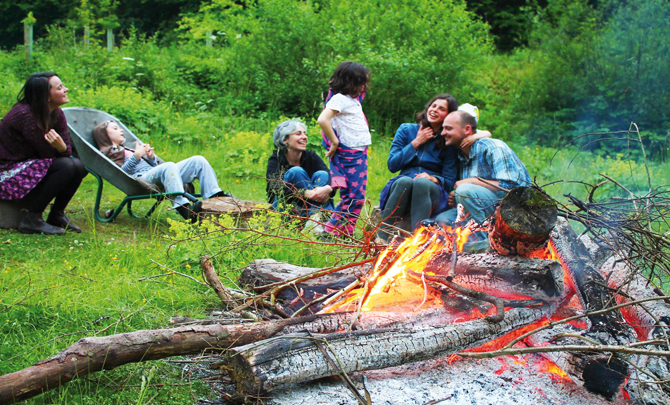Interview: Into the woods - Reform Magazine
The writer and community founder Tobias Jones talks to Stephen Tomkins
In 2005, the writer Tobias Jones spent a year touring alternative communities in Britain and Italy with his family, in the hope of finding a way of life free from the dislocation, haste and consumer dissatisfaction of modern life. The journey is described in his book Utopian Dreams (Faber & Faber, 2007, £7.99). Inspired by the Christian community of Pilsdon in Dorset, in 2009, Tobias, his wife Francesca and their three young children bought Windsor Hill Wood, a house in ten acres of Somerset woodland, and opened their doors to anyone who wanted to join them – people recovering from addiction or break up, dealing with trauma or mental health conditions, leaving prison or sex work. They kept no personal possessions, sharing everything in common, and worked the land in order to live. It was, in Tobias̕ words, a calling “to turn the Sermon on the Mount into a manifesto for life”.
Tobias describes the “mishaps and miracles” of this community in his latest book A Place of Refuge (Quercus, 2015, £9.99). The book is a compellingly unromantic but inspirational account of the venture, showing such community to be both gruelling and transformative. Since the book was written, Tobias and Francesca have started to look for someone to take over Windsor Hill Wood.
When you set out on what you call “this strange pilgrimage” to explore communities, you were clearly driven by a profound disenchantment with modern life.
It was a long time coming. There is so much loneliness and isolation and privatisation – in the sense that everything in our lives is segmented and not shared, not public. Fewer and fewer things are held in common. It had been nagging at me for a long time.
Did Windsor Hill Wood provide the antidote?
Almost too much of an antidote! Windsor Hill Wood was very much the deep end of communal living. Communal living is very hard anyway, but to try to accommodate ten to 12 people in a ten-acre space and what is essentially a four-bedroom house, and doing so with a lot of recovering addicts and ex-offenders and the rest, was a very tall order. But it certainly worked. It convinced me of the benefits of sharing, eating together, holding things in common. That really works.
It seems to me a Christian community, without being a community of Christians – devoted to Christian love and neighbourliness, but without expecting guests to join in religious activities.
It’s really interesting. I scratched my head long and hard about this. Since we paused the community six months ago, as often happens when you stop doing something, I’ve been reflecting on it, and one of the things I’ve thought most about is how Christian it was – whether it should have been more Christian, or more explicit, or more implicit.
Our motivation was certainly inspired by Jesus and the Gospels; that’s always been very explicit. And we would go to the chapel we built a couple of times of day – but that was optional and it was often just silence so it could be inclusive. We bent over backwards not to upset anyone, but it would probably have been a more stable place if we hadn’t. We always said grace before meals so it was clear what we stood for. But it was difficult because we were in a minority: we were a family of five – in terms of adults it was me and Francesca; 95% of our guests weren’t Christians so we had endless compromise. And with people in recovery you shouldn’t try to do mission at the same time as medicine. Yes, it was one of the most difficult things. I’m still scratching my head about it, thinking about what we got right and wrong.
There is a lot in the book about going into the venture without wanting to put rules and expectations on people but actually discovering, as time goes by, that’s what people need and want from you.
Yes, the danger is communities can become cults – people offer money and cut links with their relatives and idolise you. It’s very difficult to resist the temptation to become a dictator. But people did want structure and rules and rhythm.
For the guys coming out of prison or the army it was obvious that’s what they needed, but it was the same for people coming out of addiction and such things. Everyone wanted a timetable. They wanted clarity. So yes, that wishy-washy benevolence we started with didn’t work. It needed clarity…
___
This is an extract from the June 2016 edition of Reform.















Submit a Comment